James has been coming to help me teach some make-up classes this week, finishing up a two-part lesson that began with me showing Philadelphia, and has concluded with a long, somewhat interactive lesson on HIV/AIDS that goes into gloriously redundant detail in ultra-simple English. I've even strategically placed some Chinese within the lesson, to explain more complex words like syndrome and virus (as opposed to bacteria) and condom.
The class has been going well, and I'm glad, because beyond being extremely practical in its goals, it's also something the students are familiar enough with that they don't feel completely unmoored from everything. Even the bored arms-crossed-head-down-in-abject-exhaustion students seem to be focusing, however drowsy-eyed, on what we're saying. It took a bit of planning and revision to make the lesson simple yet not shallow, a careful dance of information and simplification followed by re-emphasizing (sometimes again and again) later. But beyond just what we're reading in class, giving a lesson with someone else there is a welcome change.
I often feel like teaching here is kind of like being a stand-up comedian. (Well, it's kind of like a lot of things, but I'm in a good mood so I'll limit my comments to just the one.) I begin a lesson on Monday, and it's crude and clumsy, a freakish Quasimodo of ideas. By the end of the week, I've cut, trimmed, revised, and refined it down to a nucleus of effectiveness, if not learning. This can mean using groups on Tuesday after I thought solo work would do on Monday, to an extra page of examples and vocabulary after one class bombed, to telling the same stupid story or joke at the same moment to keep the class engaged and awake. And now with James in class, it's like a comic duo, playing off each other, setting each other up for questions and hitting cues like the Marx Brothers.
And there's a certain satisfaction that comes from hitting all the right notes in a lesson, from seeing heads nod in understanding, that quiet murmur of assent when students comprehend what we're talking about. That's been easier to achieve with this lesson, and I don't know if it's been James, the preparation, or what. Who knows, it could be his brief American Sign Language lessons at the end of each class? Or the one-two punch of the film and the lesson, the human face on the ideas and the disease? The students have really been responding to it well, and sometimes, I actually feel like a real teacher.
But I gotta say, there's another kind of satisfaction, and that only comes from ordering thirty people to say things like "condom" and "vaginal fluid" out loud, until you're satisfied.
See Matt. See Matt blog. Blog, Matt, blog.
Thursday, May 29, 2008
Monday, May 26, 2008
Is it June yet? (And: Thoughts on a Chinese party)
I feel intense hatred toward linear time right now, because I cannot honestly believe it's still May and I'm still here. This has been the slowest month in China by far, and while the days seem busy enough, the fact that it's only May 26 and not, oh, I dunno, June 11, really pisses me off.
This term, in addition to my freshmen, I've been teaching a class of prospective post-graduate MBA students who will (if all things visa-related go well) travel to Madison, Wisconsin to study at Edgewood College in September. I use that word "class" loosely, though, since it's really only been two men (and a third student, a woman who is perpetually coming next time). I've given them the English names Paul (a mid-twenties office-type who studied and worked in Beijing) and Brian (a mid-thirties bank clerk who has risen to the top of Jilin's Bank of China). It was supposed to be Mike and Brian, after my uncles, but Paul didn't like the name Mike (blame some NBA player named Mike who fouled Yao Ming once). So I asked Paul what his name meant in Chinese, and he told me stone, and so I got all biblical and gave him Paul. Then I realized two weeks later that I'd mixed my Christian P's, it should have been Peter, but he liked Paul so the name stuck.
This class has been an interesting way to meet some Chinese who don't fall under the umbrella of obscenely sheltered undergraduate English majors. Brian has a family and a damn good job as the president (or something ... important, he assures me) of the Bank of China in Jilin, and when we had dinner at his home and I met his parents, I realized Brian is the ideal of the new upwardly mobile generations in China, a man from humble origins whose parents were laborers who has gone on to a good job, a nice home, a car, money, affluence ... he's like a poster-child for what most people in China shoot for, of the success China hopes the white-hot economy and its one-child policy can create. Paul, a little younger but also educated, has lived in the capital and seen more of China in his twenty-odd years than most of my other students will ever see. They're both smart guys that have the money and clout to get into a program that will send them abroad and earn them a bona-fide American diploma, and that's a write-your-own-ticket kind of deal here.
The class has been good, if awkward. Brian began the class pretty much incapable of speaking English, whereas Paul was pretty good from the start. Through a lot of effort on his part, Brian has improved a great deal, but I still think he'll have a rough go of it in the states (that's assuming he passes the English interview for his visa). Our class has been a four-hour block of class on Saturday afternoon for the past ten weeks, with no book, no material, no final exam, no help whatsoever from the "school" I'm supposedly employed at that keeps cashing all those tuition checks. I asked the jackass in charge what I was supposed to teach in this class, and he told to just show them a movie each week, or have them take me out to eat. First class, BeiHua. Anyway, I've been doing my best to make the class useful for them, but as anyone that's ever tried to study a language can tell you, a once-a-week four-hour cram session is, shall we say, less than ideal.
In class I've tried to balance practical vocabulary (like directions, eating, shopping, and dealing with every-day problems) with concerns about their medical insurance, costs of living, work-study jobs, and life in America. We've looked at the maps of Edgewood and Madison and tried to get a feel for where they'll be living, alongside learning how to order a drink in a bar and not get a glass of chardonnay (all alcohol in China is called 酒, jiu, which translates to wine, so I've had to explain what "wine" is in the West and how to make sure you get whiskey or beer when you want it). We've met outside of class as much as we've met in class, for meals or at Brian's home to meet his family, and this has really been an extraordinary glimpse of real life in China. And last Saturday, in lieu of our final class being another dull round of vocabulary in a classroom, Brian invited Paul and I out to a party for his co-worker's wife's father's sixtieth birthday. A tenuous connection, that, but why not?
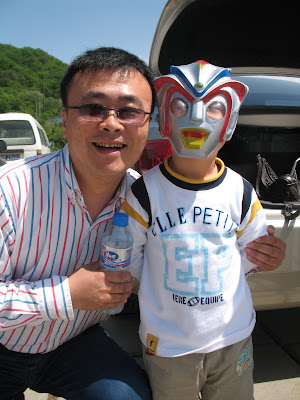
Brian and his son, who calls me Superman.

He also talks to me in Chinese like we're best pals. All I can do is nod and smile.
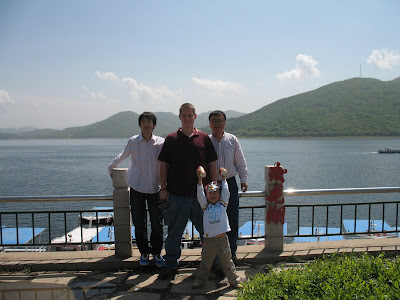
Paul, me, and Brian, and 弟弟, didi, little brother.
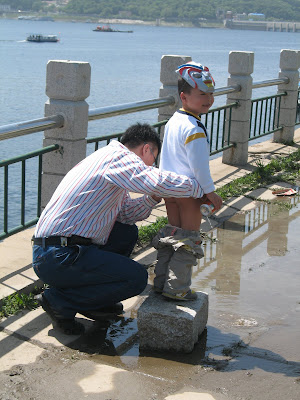
Why not? The puddle was already there! (Bonus caption: man that kid had to go!)
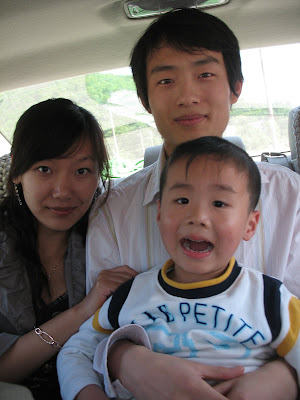
Paul, 弟弟, and Paul's girlfriend.

For the party, they chartered a boat at the Song Hua Hu (松花湖), the same lake where I was camping a few weeks ago.
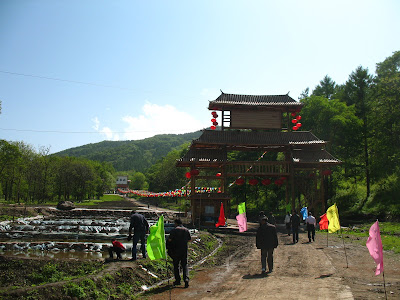
The boat landed on an island, and after we walked a ways, we came up to a tiny restaurant that seemed like the closest China has had to Woodloch. The whole restaurant was rented out for the big party.
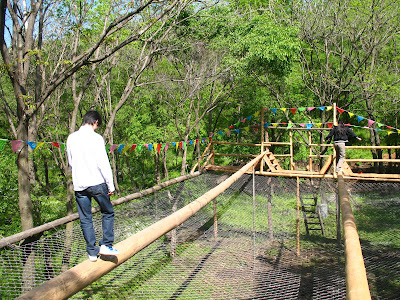
Balance beams!

Made it there and back!
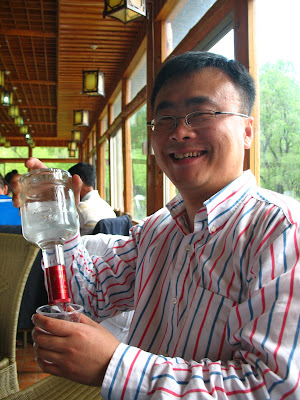
At the party, Brian pours us some 白酒, baijiu, "white wine." This unspeakably horrid drink is the drink of China; it is to China what vodka is to Russia, Guinness to Ireland, Coke to America. This "white wine" is closer to nail-polish remover (or, barring that, hard alcohol) than it is cab-sauv, but herein lies the root of the wine =/= alcohol conundrum for Chinese learning English.

Those two plastic cups are water. I swear.
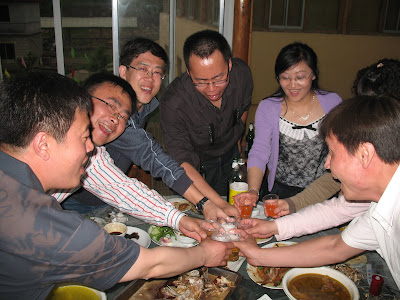
At the party, the host had to go to each table and make a toast, probably several. Brian, being a higher-up at the bank, had to do the same. Thankfully they had switched to beer at this point, because ...

... yours truly got in on the next toast. The man on the right of the picture is Brian's co-worker, and it's his wife's father whose birthday was being celebrated. Which means he was toasting all day, and getting quite drunk.
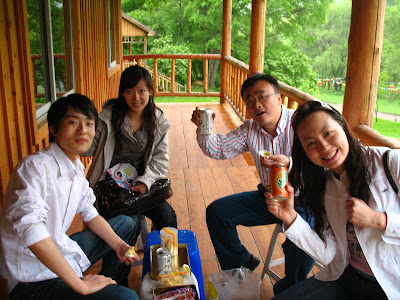
After the big meal, we waited out the rain on the porch of a tiny cabin. Paul and his girlfriend along with Brian and his wife. I can never say her name correctly so I just call her 姐姐, jiejie, big sister.

Back to the boat.
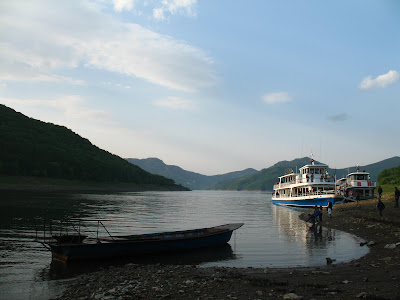
Naturally beauty, where you been all my life? (那个地方有山有水.)
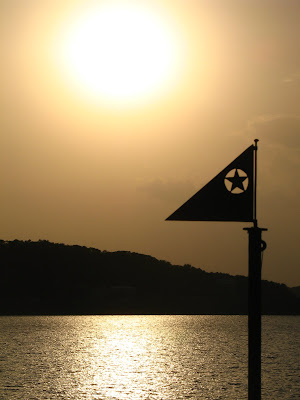
And back again.
I realized at the party that it's not Jilin that's getting to me, it's not China. (Well, it is, but that's only half of it.) It's missing home. It's wanting to spend my Saturday at a birthday party for someone I actually know, someone I can have a meaningful conversation with. It's wanting to spend time with my friends and family back home, and not flop around awkwardly like a fish in a bucket of milk at a dinner party where I can barely speak the language. It's an incredibly isolating experience sometimes, being here and having no one to really talk to. I have the other Maryknollers here at BeiHua, true, but it's hard talking to the same people in such a small group for so long without any outside input. It's hard to live in a place where no one speaks the language well enough to have an honest talk, where you sit there and are amazed at the pat tripe you spew out to students and other English learners, because they can't handle or understand how you really feel. That's what I felt at this party: it was nice, it was a good experience, and I was happy to go, but being there just made me realize how forever alien this place will be to me, and I to it.
This term, in addition to my freshmen, I've been teaching a class of prospective post-graduate MBA students who will (if all things visa-related go well) travel to Madison, Wisconsin to study at Edgewood College in September. I use that word "class" loosely, though, since it's really only been two men (and a third student, a woman who is perpetually coming next time). I've given them the English names Paul (a mid-twenties office-type who studied and worked in Beijing) and Brian (a mid-thirties bank clerk who has risen to the top of Jilin's Bank of China). It was supposed to be Mike and Brian, after my uncles, but Paul didn't like the name Mike (blame some NBA player named Mike who fouled Yao Ming once). So I asked Paul what his name meant in Chinese, and he told me stone, and so I got all biblical and gave him Paul. Then I realized two weeks later that I'd mixed my Christian P's, it should have been Peter, but he liked Paul so the name stuck.
This class has been an interesting way to meet some Chinese who don't fall under the umbrella of obscenely sheltered undergraduate English majors. Brian has a family and a damn good job as the president (or something ... important, he assures me) of the Bank of China in Jilin, and when we had dinner at his home and I met his parents, I realized Brian is the ideal of the new upwardly mobile generations in China, a man from humble origins whose parents were laborers who has gone on to a good job, a nice home, a car, money, affluence ... he's like a poster-child for what most people in China shoot for, of the success China hopes the white-hot economy and its one-child policy can create. Paul, a little younger but also educated, has lived in the capital and seen more of China in his twenty-odd years than most of my other students will ever see. They're both smart guys that have the money and clout to get into a program that will send them abroad and earn them a bona-fide American diploma, and that's a write-your-own-ticket kind of deal here.
The class has been good, if awkward. Brian began the class pretty much incapable of speaking English, whereas Paul was pretty good from the start. Through a lot of effort on his part, Brian has improved a great deal, but I still think he'll have a rough go of it in the states (that's assuming he passes the English interview for his visa). Our class has been a four-hour block of class on Saturday afternoon for the past ten weeks, with no book, no material, no final exam, no help whatsoever from the "school" I'm supposedly employed at that keeps cashing all those tuition checks. I asked the jackass in charge what I was supposed to teach in this class, and he told to just show them a movie each week, or have them take me out to eat. First class, BeiHua. Anyway, I've been doing my best to make the class useful for them, but as anyone that's ever tried to study a language can tell you, a once-a-week four-hour cram session is, shall we say, less than ideal.
In class I've tried to balance practical vocabulary (like directions, eating, shopping, and dealing with every-day problems) with concerns about their medical insurance, costs of living, work-study jobs, and life in America. We've looked at the maps of Edgewood and Madison and tried to get a feel for where they'll be living, alongside learning how to order a drink in a bar and not get a glass of chardonnay (all alcohol in China is called 酒, jiu, which translates to wine, so I've had to explain what "wine" is in the West and how to make sure you get whiskey or beer when you want it). We've met outside of class as much as we've met in class, for meals or at Brian's home to meet his family, and this has really been an extraordinary glimpse of real life in China. And last Saturday, in lieu of our final class being another dull round of vocabulary in a classroom, Brian invited Paul and I out to a party for his co-worker's wife's father's sixtieth birthday. A tenuous connection, that, but why not?
Brian and his son, who calls me Superman.
He also talks to me in Chinese like we're best pals. All I can do is nod and smile.
Paul, me, and Brian, and 弟弟, didi, little brother.
Why not? The puddle was already there! (Bonus caption: man that kid had to go!)
Paul, 弟弟, and Paul's girlfriend.
For the party, they chartered a boat at the Song Hua Hu (松花湖), the same lake where I was camping a few weeks ago.
The boat landed on an island, and after we walked a ways, we came up to a tiny restaurant that seemed like the closest China has had to Woodloch. The whole restaurant was rented out for the big party.
Balance beams!
Made it there and back!
At the party, Brian pours us some 白酒, baijiu, "white wine." This unspeakably horrid drink is the drink of China; it is to China what vodka is to Russia, Guinness to Ireland, Coke to America. This "white wine" is closer to nail-polish remover (or, barring that, hard alcohol) than it is cab-sauv, but herein lies the root of the wine =/= alcohol conundrum for Chinese learning English.
Those two plastic cups are water. I swear.
At the party, the host had to go to each table and make a toast, probably several. Brian, being a higher-up at the bank, had to do the same. Thankfully they had switched to beer at this point, because ...
... yours truly got in on the next toast. The man on the right of the picture is Brian's co-worker, and it's his wife's father whose birthday was being celebrated. Which means he was toasting all day, and getting quite drunk.
After the big meal, we waited out the rain on the porch of a tiny cabin. Paul and his girlfriend along with Brian and his wife. I can never say her name correctly so I just call her 姐姐, jiejie, big sister.
Back to the boat.
Naturally beauty, where you been all my life? (那个地方有山有水.)
And back again.
I realized at the party that it's not Jilin that's getting to me, it's not China. (Well, it is, but that's only half of it.) It's missing home. It's wanting to spend my Saturday at a birthday party for someone I actually know, someone I can have a meaningful conversation with. It's wanting to spend time with my friends and family back home, and not flop around awkwardly like a fish in a bucket of milk at a dinner party where I can barely speak the language. It's an incredibly isolating experience sometimes, being here and having no one to really talk to. I have the other Maryknollers here at BeiHua, true, but it's hard talking to the same people in such a small group for so long without any outside input. It's hard to live in a place where no one speaks the language well enough to have an honest talk, where you sit there and are amazed at the pat tripe you spew out to students and other English learners, because they can't handle or understand how you really feel. That's what I felt at this party: it was nice, it was a good experience, and I was happy to go, but being there just made me realize how forever alien this place will be to me, and I to it.
Thursday, May 22, 2008
Reverse Culture Shock
It's strange, as I go through this slow extraction process, how I am begging to feel like I felt when I first arrived nearly two years ago in Zhanjiang, when I was deep in the throes of culture shock. I was exhausted, impatient, mentally unfocused, quick to anger, and all sorts of other unpleasantness. And now, like a novel that begins to echo itself in its final chapters, I find that I am once again often tired, and extremely unmotivated, and grumpy. I feel apathetic toward so many things here, a thick stubbornness growing in my mind, attitudes about this place shifting as I march toward the exit and begin to forgive less and less of every-day China.
What's the reverse of culture shock? Culture saturation? I've been wading through China for nearly two years now, and my attitudes have shifted dangerously close to how things were in the beginning. Well, not close, but let's say the first impressions weren't far from the mark.
I first arrived in China terrified to say anything bad about the place, fearful of being an ugly ethnocentric foreigner. I was happy, even quick to criticize America and the West, so familiar and so clearly in error in many ways, whereas here was China, a place I accepted at face value and was too ignorant of to talk intelligently about, let alone criticize. I was confused and angered by a lot of the foolishness (and yes I know that sounds like a grandma word) I saw in China all the time, but I swept it all under the mental carpet of "wow this is amazing these people are beautiful YAY!" A novice to the language, I looked at it as an incomprehensible mess of strokes and symbols that three lifetimes of effort could never decode. And now I've swung from passive acceptance of all that every-day ugliness to once again being angry about it, but not being afraid to say so; to once again being able to look at a piece of paper, to understand how the language and the characters are put together, and still chalk it all up as hopeless.
I got in a fight with a cabbie the other day. It was raining pretty hard, and James and I were coming back from the gym. Flag the cab down, heading to campus, the guy was speeding like a madman, incredibly unsafe *in the rain*, and trust me, it's a feat bordering on a deathwish to be in a cab in China and feel especially unsafe. This guy managed to do that. We told him to slow down a bunch of times, but he only grinned, a slow stupid smirk showing on his face in the rear-view mirror. He continued to cut people off, use the horn instead of the breaks, and drive with needless abandon. We arrived at the gate to our campus, still raining, and the jackass refused to drive in through the gate and up to the door. We asked, prodded, told him it was OK, and he just returned some bullshit answer in the typical bored Chinese male attitude, the "too bored to even consider whatever it is you're suggesting" voice. "你是白痴," "Ni shi bai chi," "You're an idiot," I said, threw the money on the seat, jumped out and slammed the door. He opened his door and was yelling at James and I as we just walked toward our dorm in the rain.
I guess that's how you know you've been here too long: when you're calling people idiots for being idiots, in the native language, not feeling impressed that you said it correctly, not even caring.
What's the reverse of culture shock? Culture saturation? I've been wading through China for nearly two years now, and my attitudes have shifted dangerously close to how things were in the beginning. Well, not close, but let's say the first impressions weren't far from the mark.
I first arrived in China terrified to say anything bad about the place, fearful of being an ugly ethnocentric foreigner. I was happy, even quick to criticize America and the West, so familiar and so clearly in error in many ways, whereas here was China, a place I accepted at face value and was too ignorant of to talk intelligently about, let alone criticize. I was confused and angered by a lot of the foolishness (and yes I know that sounds like a grandma word) I saw in China all the time, but I swept it all under the mental carpet of "wow this is amazing these people are beautiful YAY!" A novice to the language, I looked at it as an incomprehensible mess of strokes and symbols that three lifetimes of effort could never decode. And now I've swung from passive acceptance of all that every-day ugliness to once again being angry about it, but not being afraid to say so; to once again being able to look at a piece of paper, to understand how the language and the characters are put together, and still chalk it all up as hopeless.
I got in a fight with a cabbie the other day. It was raining pretty hard, and James and I were coming back from the gym. Flag the cab down, heading to campus, the guy was speeding like a madman, incredibly unsafe *in the rain*, and trust me, it's a feat bordering on a deathwish to be in a cab in China and feel especially unsafe. This guy managed to do that. We told him to slow down a bunch of times, but he only grinned, a slow stupid smirk showing on his face in the rear-view mirror. He continued to cut people off, use the horn instead of the breaks, and drive with needless abandon. We arrived at the gate to our campus, still raining, and the jackass refused to drive in through the gate and up to the door. We asked, prodded, told him it was OK, and he just returned some bullshit answer in the typical bored Chinese male attitude, the "too bored to even consider whatever it is you're suggesting" voice. "你是白痴," "Ni shi bai chi," "You're an idiot," I said, threw the money on the seat, jumped out and slammed the door. He opened his door and was yelling at James and I as we just walked toward our dorm in the rain.
I guess that's how you know you've been here too long: when you're calling people idiots for being idiots, in the native language, not feeling impressed that you said it correctly, not even caring.
Saturday, May 17, 2008
This Is How The Journey Ends
Not with a bang, but with a long, profound groan.
I've been showing Philadelphia to my students this weekend, part of a two-class lesson on HIV/AIDS that will wrap up next week with a short quiz on the film, some shamelessly fact-dropping dialogues, and well-anticipated awkward silences as I talk about sexual-transmitted diseases in front of a group of students who still laugh at the equivalent of peek-a-boo. Yesterday the film went over pretty well: Chinese subtitles on (because there was no way in hell my students would understand a second of the film otherwise), the students were a great audience, laughing and sighing and nearly crying right where the director wanted them to. Today, well, not so much. I guess tonight was the stragglers, the lets-go-to-Matthew's-movie-and-sleepers, the twinkling screens of re-re-re-checked mobile phones creating a constellation of boredom in the yawning high-ceilinged lecture hall. Some paid attention, some tried to understand, some must have enjoyed the film, but all it did was leave me with a profound longing for home, mixed with feelings of intense resentment and venomous apathy for the rest of the classes I have to teach here in Jilin.
But what am I complaining about? All I have is a wildly unfulfilling job that is inexorably albeit slowly coming to a close. There are far more serious problems in the world, in China. To wit: estimates of up to 50,000 dead and missing as a result of the Sichuan earthquake. I was having a drink the other night with Kevin Clancy, Father Brian (the chronically busy Maryknoll priest here in Jilin), Kevin, Jenny, and Jim, and Jim raised an interesting point. This is China, the land of the One Child Policy. Now that's policy, friends, not a law: many people can and do have more than one child, but it's rare, and it only seems to happen if you're especially wealthy, live in a province with really lax enforcement, live in the country, or (this is China, after all) you know the right people. But for the most part, families do have one child.
And now, for many families, that child is gone, as an unimaginable number of children perished in the disproportionate number of cheap, poorly-made schools that collapsed in the quake.
The earthquake has effected the entire country. And maybe that was why my students didn't care to see a movie about AIDS, about more death and sadness. From having a student break down crying in my class because her boyfriend from Sichuan was unreachable, to having students comment on 2008 being a "terrible" year for China when just days ago they were beaming with Olympic pride ... it's been a strange time here, just five days from the event. When Americans mourned for Hurricane Katrina, where just under 2,000 died, we were saturated with grief. China, and my students, are still reeling from a far more profound disaster.
Well that's quite a pluralistic combo, complaining about being here and then indulging in the human vantage living here affords. That's the paradox, the combination of frustration and insight, that this place brings. I learned from Father Brian that my blog is being read on the radio, on his radio show, here in Jilin. Well, this should make for interesting broadcasting.
Some good news to close: James just finished running a marathon along the Great Wall of China, just outside Beijing. This time last year, Nicki was about to hop over to Hong Kong to run a half-marathon there. For what it's worth, I just ran all the way from campus, along the river, to the heart of Jilin city, for the first time. Not exactly a marathon, but, well, one landmark at a time.
I've been showing Philadelphia to my students this weekend, part of a two-class lesson on HIV/AIDS that will wrap up next week with a short quiz on the film, some shamelessly fact-dropping dialogues, and well-anticipated awkward silences as I talk about sexual-transmitted diseases in front of a group of students who still laugh at the equivalent of peek-a-boo. Yesterday the film went over pretty well: Chinese subtitles on (because there was no way in hell my students would understand a second of the film otherwise), the students were a great audience, laughing and sighing and nearly crying right where the director wanted them to. Today, well, not so much. I guess tonight was the stragglers, the lets-go-to-Matthew's-movie-and-sleepers, the twinkling screens of re-re-re-checked mobile phones creating a constellation of boredom in the yawning high-ceilinged lecture hall. Some paid attention, some tried to understand, some must have enjoyed the film, but all it did was leave me with a profound longing for home, mixed with feelings of intense resentment and venomous apathy for the rest of the classes I have to teach here in Jilin.
But what am I complaining about? All I have is a wildly unfulfilling job that is inexorably albeit slowly coming to a close. There are far more serious problems in the world, in China. To wit: estimates of up to 50,000 dead and missing as a result of the Sichuan earthquake. I was having a drink the other night with Kevin Clancy, Father Brian (the chronically busy Maryknoll priest here in Jilin), Kevin, Jenny, and Jim, and Jim raised an interesting point. This is China, the land of the One Child Policy. Now that's policy, friends, not a law: many people can and do have more than one child, but it's rare, and it only seems to happen if you're especially wealthy, live in a province with really lax enforcement, live in the country, or (this is China, after all) you know the right people. But for the most part, families do have one child.
And now, for many families, that child is gone, as an unimaginable number of children perished in the disproportionate number of cheap, poorly-made schools that collapsed in the quake.
“Our grief is incomparable,” said Li Ping, 39, eyes rimmed red, as he and his wife slowly, carefully pulled a pair of pink pajamas over the bruised, naked body of their 8-year-old daughter, Ke. “We got married late, and had a child late. She is our only child.”
The earthquake has effected the entire country. And maybe that was why my students didn't care to see a movie about AIDS, about more death and sadness. From having a student break down crying in my class because her boyfriend from Sichuan was unreachable, to having students comment on 2008 being a "terrible" year for China when just days ago they were beaming with Olympic pride ... it's been a strange time here, just five days from the event. When Americans mourned for Hurricane Katrina, where just under 2,000 died, we were saturated with grief. China, and my students, are still reeling from a far more profound disaster.
Well that's quite a pluralistic combo, complaining about being here and then indulging in the human vantage living here affords. That's the paradox, the combination of frustration and insight, that this place brings. I learned from Father Brian that my blog is being read on the radio, on his radio show, here in Jilin. Well, this should make for interesting broadcasting.
Some good news to close: James just finished running a marathon along the Great Wall of China, just outside Beijing. This time last year, Nicki was about to hop over to Hong Kong to run a half-marathon there. For what it's worth, I just ran all the way from campus, along the river, to the heart of Jilin city, for the first time. Not exactly a marathon, but, well, one landmark at a time.
Wednesday, May 14, 2008
One Month
Kevin "The Man" Clancy is here in Jilin, checking up on us Maryknollers and making sure we haven't burned this city to the ground yet. He got in to the Lucky Forest some time around five this evening, and after the foreign teachers brought a pathetically sparse edition of English Corner to a close, we went into town for dinner, met up with Kevin, and had a good long catch-up chat together.
Kevin's been married to Kaishan ("Snow White") for more than half a year now. It was good to hear how that was going, to get some tips for Jim when he and Kat tie the knot next year, to talk about this past year in Jilin and what teachers will come after us and what this program will be in the next few years as the Maryknoll priests slowly go extinct.
It's about one month and counting for me here in Jilin. I look back at last September, I remember getting on the plane in Philly on that lost lonely August day, I remember coming in here to Jilin for the first time and seeing where I was going to live, I remember those first classes with my freshman last September that felt so familiar and yet so awkward. I've changed a lot, and in some ways I feel like I changed more this year than I did last, Jilin's harsh winter and my amazing trip through Southeast Asia acting as a kind personal and spiritual centrifuge. But in many ways this change is harder to explain, harder to put into words, harder to convey in a pat little blog entry. I feel so few people truly understood my first year here in China, so few ever had to time or the desire to really know how it affected me, so how could anyone possibly understand all that has happened in a second year?
Despite the uncertainty I face going back home, I feel all the more equipped to face it. I think I've whittled out a lot of unnecessary diversions, I've been able to see some things clearly in China despite the smog, and in just under one month, I'll be leaving China behind.
Kevin's been married to Kaishan ("Snow White") for more than half a year now. It was good to hear how that was going, to get some tips for Jim when he and Kat tie the knot next year, to talk about this past year in Jilin and what teachers will come after us and what this program will be in the next few years as the Maryknoll priests slowly go extinct.
It's about one month and counting for me here in Jilin. I look back at last September, I remember getting on the plane in Philly on that lost lonely August day, I remember coming in here to Jilin for the first time and seeing where I was going to live, I remember those first classes with my freshman last September that felt so familiar and yet so awkward. I've changed a lot, and in some ways I feel like I changed more this year than I did last, Jilin's harsh winter and my amazing trip through Southeast Asia acting as a kind personal and spiritual centrifuge. But in many ways this change is harder to explain, harder to put into words, harder to convey in a pat little blog entry. I feel so few people truly understood my first year here in China, so few ever had to time or the desire to really know how it affected me, so how could anyone possibly understand all that has happened in a second year?
Despite the uncertainty I face going back home, I feel all the more equipped to face it. I think I've whittled out a lot of unnecessary diversions, I've been able to see some things clearly in China despite the smog, and in just under one month, I'll be leaving China behind.
Monday, May 12, 2008
I'm Fine (But Thanks for Asking)
Just a quick little update: the earthquake that rocked Sichuan province is very far from where I live. I'm fine here in the northeast, Sichuan being in China's midwest.
The earthquake was in Sichuan, which is here:

And I live in Jilin, which is here:

Quite far from me, as you can see. Sichuan is the one province I was yearning to visit before I left China, home of the spicy food I love and mystical landscapes of your imagination. I won't be able to visit before I leave China, especially not now ... but one day, I shall return.
The earthquake was in Sichuan, which is here:
And I live in Jilin, which is here:
Quite far from me, as you can see. Sichuan is the one province I was yearning to visit before I left China, home of the spicy food I love and mystical landscapes of your imagination. I won't be able to visit before I leave China, especially not now ... but one day, I shall return.
Sunday, May 11, 2008
Obligatory Blogging (ObligaBlog?)
So I guess it's been a while since I last blogged. It's been, well, May, actually, my last blogging an odd stream-of-consciousness vignette about bus riding here in China. I hope I gave you a glimpse of what goes on in my mind here sometimes, and with me trying to get off campus at least once a day, getting on the bus is something I do often. Hey, one kuai bus rides beat thirteen kuai cab fares.
What's new? Not much, to be honest. Midway through May here in Jilin, and I came upon the unsettling idea that this, right here and right now, might be as good as my Chinese ever gets. I hope to study the language in America of course, to build upon all I've learned and expand my character comprehension, but let's be honest. I'm coming from an environment of total immersion and moving to one of language erosion, because the fact is, there won't be many places to actually speak Mandarin once I'm back in the states. While I don't like the idea of my Chinese being doomed to the nether reaches of my mind's attic, leaving China and living in America are going to present far harsher realities than that. I'm not giving up on the language, still paying those tutors and going to class. We'll see how it goes.
But that's to come, later, after Jilin and after Europe and Vermont this summer. What's happened here in Jilin has been a holiday, about a week and a half ago, the May Day (May 1) holiday, Chinese Labor Day. Jim was off escorting his second cousin through the wilds of Beijing, and so Kevin, James, and I joined Jenny and our friend Michelle, a Canadian foreign teacher at a nearby school, for a little camping on Five Tiger Island (五虎岛, Wu Hu Dao) in the middle of the Song Hua Lake (松花湖, Song Hua Hu).
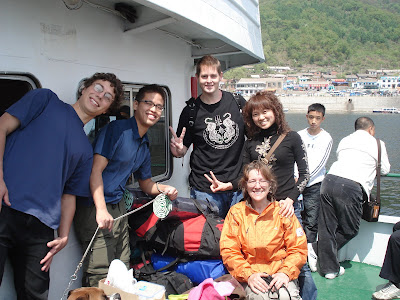
On the ferry with all out stuff, ready to go camping on Five Tiger Island. We got there and realized that the island has more or less been converted into a half-assed amusement park. Nevertheless, we struck out for a remote corner of the island, determined to camp.
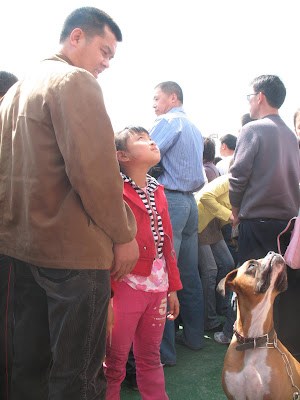
The star of the trip was undoubtedly Pengyou (peng, rhymes with rung, and you, as in Yo!), Michelle's energetic boxer that she brought all the way from Canada. The Chinese don't keep dogs as pets in the same way Westerners do; if they're big, they're either dinner, or guard dogs treated like any other beast of burden (which is to say, poorly), or they're tiny and completely nonthreatening. To see a dog the size of Pengyou out and about was a consistent shocker to most Chinese. To help keep things calm, Michelle has named him Pengyou (朋友, "friend" in Chinese), and tried to train him in Chinese (sit, shake, etc.) This calms most cynophobes down, but some still get freaked out when they seem him.
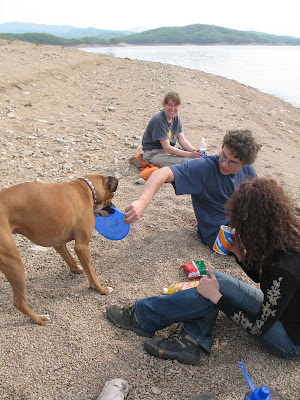
Laying on the gravely beach, playing with Pengyou.

Pengyou helps James gather some firewood.

We got a good fire going to cook dinner (*ahem*usingMichelle'sgasstove*ahem*), and to teach Jenny about the magical awesomeness of s'mores.

The sun begins to set.
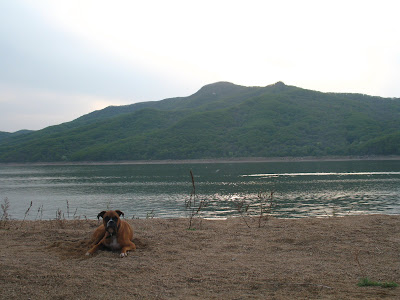
What can I say, Pengyou's a photogenic dog. I miss Duke.
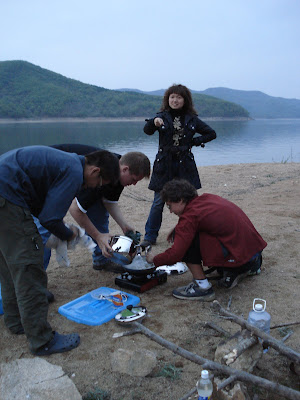
Ladies cooked, so the guys cleaned.
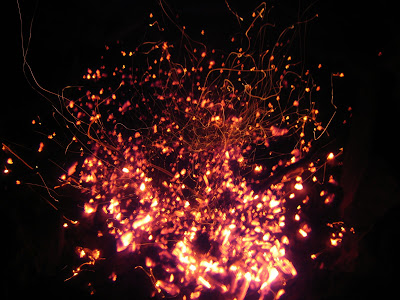
Playing with the aperture of my camera.
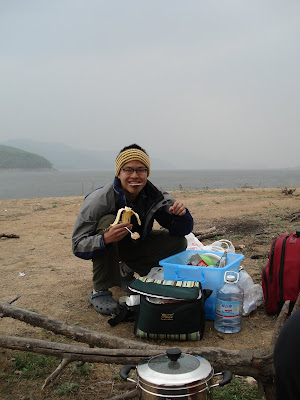
James can multi-task.

Camping on Five Tiger Island: success!

With the weather quickly going from cloudy to rainy, we packed up our gear and cut our camping time down to just one night. Just in time, though, as we made it back mid-downpour (which would not have been fun in those tents), and with enough time to spend the next day in Changchun (长春), Jilin's capital city.

The throne room of the last Qing emperor, who sided with the invading Japanese during World War II in the hope of regaining power in China. He "ruled" a huge area of Northeast China that was seized by the Japanese, but really he was merely a puppet. This is known to most Westerners as the Manchurian government. There is a lot of lingering anti-Japanese venom in these parts of the country, and the government does nothing to quell the hatred; in fact, they often encourage it.

Yummy street food in Changchun.
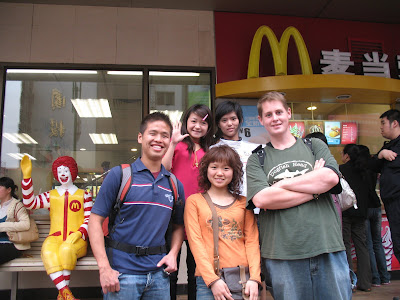
We ran in to one of my students, Ariel (the girl in the pink) while walking around Changchun. She showed us a Christian book store that served cheap brownies and Starbucks coffee.
So that was the May Day holiday. Not bad! Some camping, some s'mores, a day in Changchun ... can't complain. More photos here. And now we're entering mid-May, it's Mother's Day already (I already called home ... did you?), and before I know it, it'll be June and time to get outta here.
What's new? Not much, to be honest. Midway through May here in Jilin, and I came upon the unsettling idea that this, right here and right now, might be as good as my Chinese ever gets. I hope to study the language in America of course, to build upon all I've learned and expand my character comprehension, but let's be honest. I'm coming from an environment of total immersion and moving to one of language erosion, because the fact is, there won't be many places to actually speak Mandarin once I'm back in the states. While I don't like the idea of my Chinese being doomed to the nether reaches of my mind's attic, leaving China and living in America are going to present far harsher realities than that. I'm not giving up on the language, still paying those tutors and going to class. We'll see how it goes.
But that's to come, later, after Jilin and after Europe and Vermont this summer. What's happened here in Jilin has been a holiday, about a week and a half ago, the May Day (May 1) holiday, Chinese Labor Day. Jim was off escorting his second cousin through the wilds of Beijing, and so Kevin, James, and I joined Jenny and our friend Michelle, a Canadian foreign teacher at a nearby school, for a little camping on Five Tiger Island (五虎岛, Wu Hu Dao) in the middle of the Song Hua Lake (松花湖, Song Hua Hu).
On the ferry with all out stuff, ready to go camping on Five Tiger Island. We got there and realized that the island has more or less been converted into a half-assed amusement park. Nevertheless, we struck out for a remote corner of the island, determined to camp.
The star of the trip was undoubtedly Pengyou (peng, rhymes with rung, and you, as in Yo!), Michelle's energetic boxer that she brought all the way from Canada. The Chinese don't keep dogs as pets in the same way Westerners do; if they're big, they're either dinner, or guard dogs treated like any other beast of burden (which is to say, poorly), or they're tiny and completely nonthreatening. To see a dog the size of Pengyou out and about was a consistent shocker to most Chinese. To help keep things calm, Michelle has named him Pengyou (朋友, "friend" in Chinese), and tried to train him in Chinese (sit, shake, etc.) This calms most cynophobes down, but some still get freaked out when they seem him.
Laying on the gravely beach, playing with Pengyou.
Pengyou helps James gather some firewood.
We got a good fire going to cook dinner (*ahem*usingMichelle'sgasstove*ahem*), and to teach Jenny about the magical awesomeness of s'mores.
The sun begins to set.
What can I say, Pengyou's a photogenic dog. I miss Duke.
Ladies cooked, so the guys cleaned.
Playing with the aperture of my camera.
James can multi-task.
Camping on Five Tiger Island: success!
With the weather quickly going from cloudy to rainy, we packed up our gear and cut our camping time down to just one night. Just in time, though, as we made it back mid-downpour (which would not have been fun in those tents), and with enough time to spend the next day in Changchun (长春), Jilin's capital city.
The throne room of the last Qing emperor, who sided with the invading Japanese during World War II in the hope of regaining power in China. He "ruled" a huge area of Northeast China that was seized by the Japanese, but really he was merely a puppet. This is known to most Westerners as the Manchurian government. There is a lot of lingering anti-Japanese venom in these parts of the country, and the government does nothing to quell the hatred; in fact, they often encourage it.
Yummy street food in Changchun.
We ran in to one of my students, Ariel (the girl in the pink) while walking around Changchun. She showed us a Christian book store that served cheap brownies and Starbucks coffee.
So that was the May Day holiday. Not bad! Some camping, some s'mores, a day in Changchun ... can't complain. More photos here. And now we're entering mid-May, it's Mother's Day already (I already called home ... did you?), and before I know it, it'll be June and time to get outta here.
Subscribe to:
Comments (Atom)


